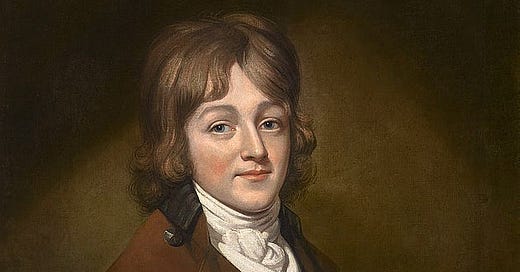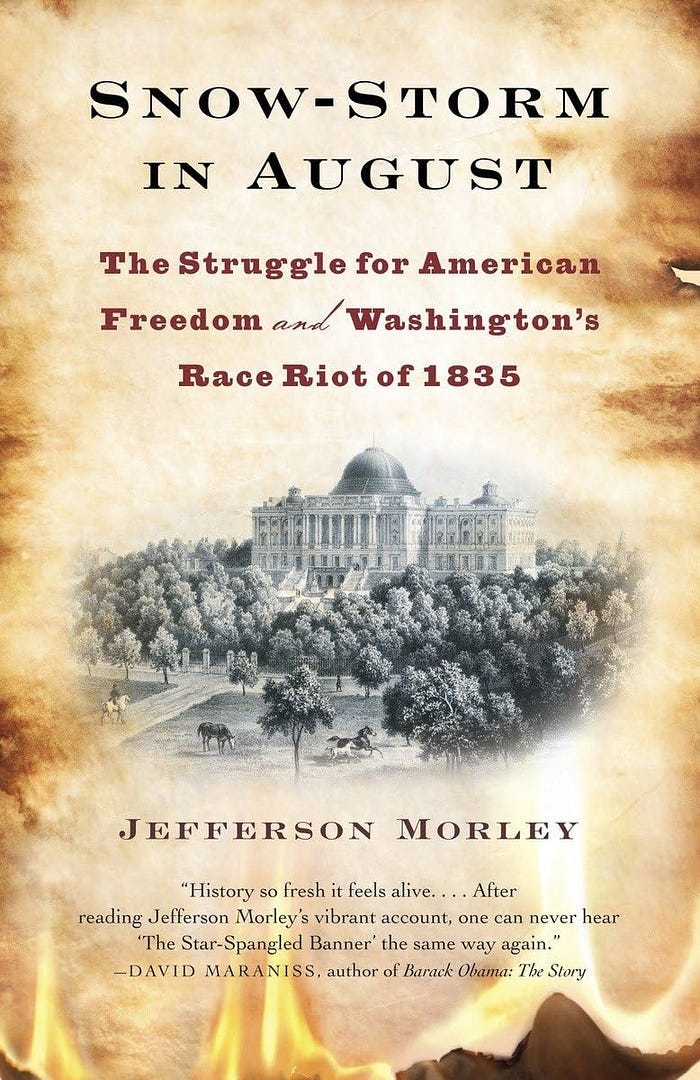With the crash bringing down the Francis Scott Key Bridge in Baltimore, attention has come to the man himself. You know Francis Scott Key, don’t you? He wrote the Star-Spangled Banner. But how much do you know about him? Thanks to my high school classmate, Jefferson Morley, whose book Snow-Storm in August features Key, I know much more than I did. There is another book named Snowstorm in August (without a hyphen) by Marshall Karp, which I’m sure is a fine book, but it is not the one I’m talking about.
Snow-Storm in August by Jefferson Morley: 9780307477484 | PenguinRandomHouse.com: Books
I remembered that Key watched the bombardment of Fort McHenry from a ship, and when dawn came, he was amazed to see the US flag still flying over the fort. I knew he was aboard a British ship, hoping to negotiate the return of his friend Dr. William Beanes, who’d annoyed British forces who had returned from sacking the Capitol to the point where they arrested him. This was two years into the War of 1812. I didn’t know Lieutenant Francis Scott Key had been leading troops defending the Capitol until they ran in fear. Not in an organized retreat, just running. Until Key found his friend was being held captive, he was hiding in his Georgetown home. The British troops took over the Capitol like it was January 6th with Rear Admiral George Cockburn sitting in the Speaker’s chair, except when they left, they burned the place down.
The way Francis Scott Key felt about Black people is somewhat complicated. He came from a family that owned many enslaved people, as did his wife. He owned slaves and lived in a city, Washington, DC, with a relatively large population of free Black men and women. There came a point during Key’s stay there when freedmen outnumbered the enslaved.
Francis, often called Frank, was a young attorney who frequently took on Black clients when many lawyers would not do so. He was known as “the Black’s” lawyer. Still, he disdained the free Black people, considering them a menace to white people. He spoke publicly of his views, calling them:
“a distinct and inferior race of people, which all experience proves to be the greatest evil that afflicts a community.”-Francis Scott Key
Others have claimed that while he made the statement, he was expressing the views of others. As proof, they cite the fact that he freed seven slaves during his lifetime without sending them to Africa, though he publicly advocated colonization. I say it’s as likely that he was too cheap to spend the money.
Key was an advisor to more than one president, having helped out James Madison and Andrew Jackson, but not so much the two presidents sandwiched in between. In those days, presidents had to help manage the city and the country and often found themselves resolving sticky situations, though there was a Mayor.
Racial tension ran high, and the “Negro Question” was being decided in Washington more so than anywhere else in the nation. It became the primary topic in the Halls of Congress. New York abolitionists and some from overseas flooded the city with anti-slave pamphlets alleged to stir up the enslaved people as if they weren’t already motivated to be free.
There were three prominent schools of thought on the subject.
The enslaved should be freed immediately and given all rights as citizens.
The enslaved should be freed and colonized, sent to Liberia or Central America.
The enslaved people should never be freed as enslavement was their lot in life.
Francis Scott Key was definitely in the second group, as was Abraham Lincoln, who believed unleashing four million Black people on the population and integrating them into society would never do.
While a young lawyer, Key might have been considered “the Black’s” lawyer, but as his career advanced and he became the city’s District Attorney, that claim could no longer be made. He was Washington, DC’s chief prosecutor and seemed to be hard on Blacks and whites alike. I found no mention of him attempting to stop the practice of slave patrols capturing free Black people at night and selling them into enslavement, which was prevalent at the time.
There was a lot of racial unrest in the city; the enslaved wanted their freedom. A Black man named John F. Cook formed the Philomathean Talking Society, where young Black men met and discussed the day’s issues. He also handed out the forbidden antislavery publications from the newly-formed American Antislavery Society. In 1835, Cook would be the Secretary of the 5th Annual Negro Convention in Philadelphia, where he helped write the convention’s declaration of war on slavery.
“We rejoice that we are thrown into a revolution where the contest is not for landed territory but for freedom. . . . Let no man remove from his native country, for our principles are drawn from the book of Divine Revelation, and are incorporated in the Declaration of Independence, ‘that all men are born equal.’”
Francis Scott Key viewed the abolitionists as a scourge that should be run out; he continued to think little of free Black men, some of whom were rising too high in society, as was restauranter Beverly Snow, featured in the story. Snow was almost lynched after a rumor spread he’d spoken ill of white women, though no individual ever stepped forward saying they heard him do so.
Key was also willing to convict an enslaved 19-year-old Arthur Bowen to his death by covering up evidence of his innocence of attempting to kill three women with an axe, including his mother. Cook was indeed drunk and possessed an axe, but he never raised it or threatened the women.
Those looking to claim that Key is a hero will find ample evidence to back them up, though proof of his cowardice also exists. The third verse of his Star-Spangled Banner, which denigrates the “hirelings and slaves,” takes on more meaning when you understand what that meant to Key. Over a thousand enslaved people from the area had taken up the offer of the British during the War of 1812 to join their forces and be free after the war. Key might have worried that his slaves would kill him in the night. He would later be influenced by a revolt at Southhampton, where a young preacher named Nat Turner killed 55 white people while seeking freedom for himself and others. Key manumitted two male slaves shortly afterward, technically allowing them to buy their freedom.
Francis Scott Key is credited with not being harsh to his slaves. I wonder about his thoughts as he watched regular coffles of the enslaved march through the city, walking in pairs, chained at the feet and yoked at the neck to whatever plantation was their destination. They might have gone by boat to New Orleans or on foot to Atlanta.
I ask you not to judge Key or his times from the 1,000-word story I write now. I highly recommend you get and read Snow-Storm in August, which is as well-researched and detailed a book as I’ve ever read. Jefferson Morley provided context in describing this era, whereas I previously only had facts. Thank you, Jefferson, for the enlightenment, which I can hopefully pass to others.






"The Negro Question." "The Jewish Question." "The Women Question." "The Catholic Question." "The Muslim Question."
Who is asking all these questions? Why do they think they get to? Is the Great White Replacement fear underlying the need to 'run the table?' (You know, "If you're not at the table you're on the table.") Maybe they worry once they are an 'official minority', America will be having a "White Man Question."
"Afraid the Slaves would kill him in the night..." common theme that. Keep them Darkies downtrodden or they will get up in the middle of the night and stab you in your bed...' Wa wa wa. What are you doing that you believe people hate you enough to WANT to get up in the middle of the night and stab you to death. There's a clue for you.
Imagine, human beings resented being treated like chattel. Seeing their families bought and sold, torn apart, often it will be the last they ever see of their loved one. Being forced to work sun-up to sun-down. Fed on scraps. Beaten, branded, women and girls raped regularly for pleasure and profit, as her offspring will be enslaved from the moment they draw breath.
Yeah, I can't imagine why you don't sleep easy in your golden beds.....
Key wasn't 'hash to his slaves.' Slavery is harshness. It says, I Own You. You Work For Me. You Will Never Be Free. You Will Not Be Paid. It Is Your Lot In Life To Live In inhuman drudgery, nameless, Powerless, without possessions, without funds, without papers, without name, or the right to choose how you spend your days, compounded with the fact that you have no right to Protect Yourself and Your Loved Ones, Who Exist in the same poisoned yoke as you, Generation after Generation... It would be Unnatural for a HUMAN BEING NOT TO RESENT, ATTEMPT TO ESCAPE FROM, THROW OFF, ARGUE AWAY, PRAY AGAINST, OR KILL TO ESCAPE A FATE LIKE THAT!
If it was really Natural and Rightous, you would NOT HAVE TO WORK SO HARD, WATCH THE ENSLAVED SO CLOSE, RESTRICT THEIR OPTIONS IN EDUCATION, COMMUNICATION WITH OTHERS, AND THE ABILITY TO MOVE ABOUT IN THE WORLD.
Nor would you need to try so hard to hammer home that they have no right to want more or to expect anything else in life.
Yeah, put that to music! Mr. Key.
Apparently , he was also a drunk.